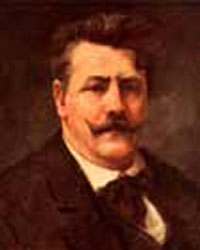He subsequently went to Egypt and to Paris where he lived a “Bohemian” existence, giving piano lessons, writing songs, such as the famous Mattinata, and playing in the “café-chantants” in the evening. In conclusion he moved to Milan. While he was waiting for the publisher Ricordi to keep his promise to bring out his opera set in the Renaissance, I Medici, in 1892 Leoncavallo understood the possibilities of the new dramatic style and, in the wake of the success of Cavalleria rusticana, wrote Pagliacci at a single stroke. This was performed at the Teatro del Verme of Milan under the direction of Toscanini. The inspiration for Pagliacci came from a criminal episode he had witnessed as a child. Pagliacci and most of the other operas of Leoncavallo, almost all published by Sonzogno, enjoyed from the beginning a vast worldwide popularity. |
|
|
|
|
Ruggero Leoncavallo - Composer Information
Search our Library
Featured Composers
Counterpoint Music Library Services
Copyright © 2012 All Rights Reserved
Copyright © 2012 All Rights Reserved
Created by Wavelength Media

